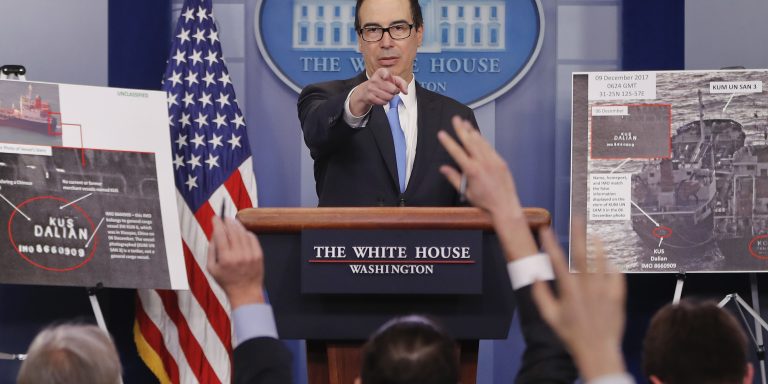INTELBRIEF
February 26, 2018
TSC IntelBrief: Sanctions on North Korea

- On February 23, 2018, the United States added 56 individuals, entities and vessels to its unilateral sanctions on North Korea.
- U.S. economic sanctions currently target around 20 countries and thousands of individuals and companies; multilateral sanctions usually hit harder but take time to implement.
- UN Security Council Resolution 2397 imposed sanctions on North Korea for its intercontinental ballistic missile program, targeting key regime revenue sources and deepening its isolation.
- Even well-enforced sanctions will not soon deter North Korea, a practiced sanctions evader with decades of experience as an international criminal actor, from continuing to pursue the means to deliver its nuclear warheads globally.
United States economic sanctions currently target not less than 20 countries, as well as thousands of individuals and entities and hundreds of aircraft and vessels. Authority for these sanctions, overseen primarily by the Treasury Department, flows from a range of statutes and Executive Orders. The Departments of State and Homeland Security separately oversee prohibitions on travel to the U.S. by sanctioned individuals, many of whom are key figures in, or backers of, the governments of sanctioned countries, or who are involved with international terrorism.
On February 23, 2018, the United States added one individual, 27 entities and 28 vessels to its unilateral North Korea sanctions program. The U.S. concurrently submitted a request to the United Nations Sanctions Committee to list 27 entities and 33 vessels. While U.S. control of the settlement of substantially all Dollar transactions gives it unusual scope to make unilateral sanctions bite, multilateral sanctions, especially those mandated by the UN, can hit a target much harder, if they are rigorously enforced. It remains to be seen whether Russia and China will object to the U.S. request to the UN. China has already objected to the unilateral additions. Unilateral sanctions have been a U.S. policy tool since 1812, but other countries also impose them, sometimes under the guise of health or safety, as Russia did with Moldovan wines. Unilateral sanctions are most effective when the sanctioning country looms large in the target’s economy—Russia was buying over 80% of Moldova’s wine in 2006, and that small country does not export much else. However, a determined regime can withstand unilateral sanctions for years, especially if neighbors look the other way.
Generally, multilateral sanctions, such as those imposed by the European Union and the U.S. on Iran over its nuclear program, are more likely to produce desired behavior change. There are more pressure points, and evasion is harder. UN Security Council Resolution 2397 on North Korea binds all UN Member-States to a detailed sanctions program with measurable targets. Shipments of refined petroleum products are to fall 89% from 2016 to 2018, and countries are to expel North Korean overseas workers, estimated to remit $500 million annually, by 2019. UNCSR 2397 also bans all major North Korean exports and prohibits the regime from acquiring heavy machinery abroad. These restrictions will, without seriously worsening the plight of the already miserable North Korean people, slow the regime’s march toward its long-sought capability to deliver a nuclear warhead anywhere in the Northern Hemisphere. But that march will continue, at least for now, because the regime can direct to its nuclear program most resources it continues to receive.
North Korea runs a massive international criminal enterprise that it will leverage to that end. Reports emerge weekly of its thefts from banks and cryptocurrency exchanges. For a price, it will find unscrupulous shippers, brokers, and bankers. Other sanctioned countries may choose to collaborate in barter, including possibly for missile technology. It will continue to acquire prohibited goods through its embassies. They have self-financed for decades by abusing diplomatic privileges to import highly-taxed or prohibited items, such as cigarettes and alcohol, for sale to host country residents. They have also locally purchased wildlife parts, such as ivory and rhino horn, as well as conflict diamonds and other precious minerals, shipping them out in diplomatic pouches – practices that the abused countries could end by ordering the North Korean embassies to close.
.
For tailored research and analysis, please contact: info@thesoufancenter.org
[video width="960" height="540" mp4="https://thesoufancenter.org/wp-content/uploads/2018/02/Final-Edit-1-138.mp4" poster="https://thesoufancenter.org/wp-content/uploads/2018/02/AP_18054653202714-2.jpg"][/video]